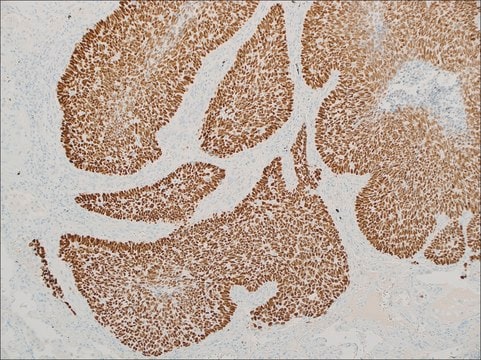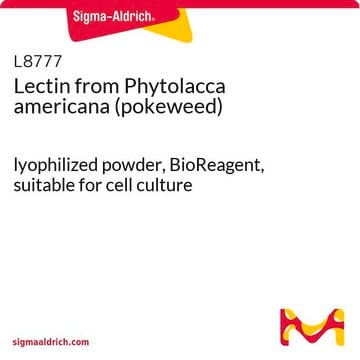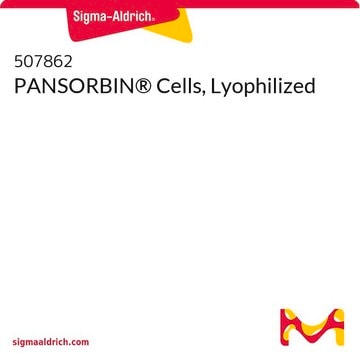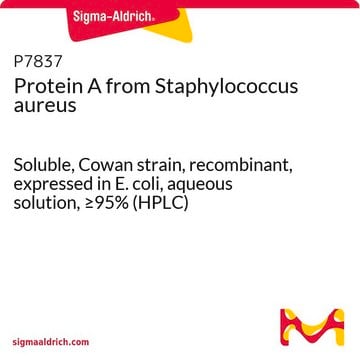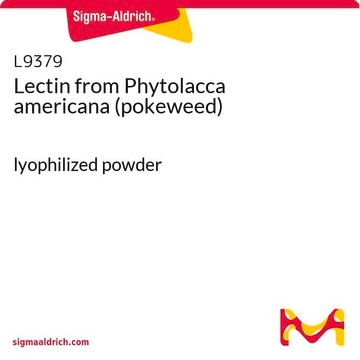507858
PANSORBIN® Cells
Synonym(s):
Staphylococcus aureus Cells
Sign Into View Organizational & Contract Pricing
All Photos(1)
About This Item
UNSPSC Code:
41116133
NACRES:
NA.42
Recommended Products
form
suspension (Homogeneous)
Quality Level
manufacturer/tradename
Calbiochem®
storage condition
do not freeze
impurities
≤2500 cells/mL Viable cells
color
milky
capacity
≥2.0 mg(human IgG/100 mg cells)
shipped in
ambient
storage temp.
2-8°C
General description
PANSORBIN Cells are heat-killed, formalin-fixed Staphylococcus aureus cells that have a coat of protein A and have been pickled by the method of Kessler. Useful for mitogenic stimulation of B lyphocytes and for immunoprecipitation.
Heat-killed, formalin-fixed Staphylococcus aureus cells (Cowan I strain) that bear a high cell-surface density of protein A and have been pickled by the method of Kessler. Useful as a solid-phase IgG-binding reagent due to the high affinity interaction of protein A with the Fc domain of IgG. PANSORBIN cells work best when the antibody is human (IgG1, IgG2, IgG4), rabbit IgG (all isotypes), or mouse (IgG2a, IgG2b, IgG3). Most common applications include immunoprecipitation and mitogenic stimulation of B lymphocytes.
Warning
Toxicity: Standard Handling (A)
Physical form
Supplied as a 10% suspension of Staphylococcus aureus cells in PBS, 0.1% NaN₃, pH 7.2.
Other Notes
Kierszenbaum, F., et al. 1991. Immunology74, 317.
Meikle, P.J., et al. 1991. J. Biol. Chem.266, 22569.
Ezaki, O., et al. 1989. Biochem. Biophys. Res. Commun. 159, 1368.
Murakami, H., et al. 1988. Biochem. J.256, 917.
Kessler, S.W. 1975. J. Immunol. 115, 1617.
Meikle, P.J., et al. 1991. J. Biol. Chem.266, 22569.
Ezaki, O., et al. 1989. Biochem. Biophys. Res. Commun. 159, 1368.
Murakami, H., et al. 1988. Biochem. J.256, 917.
Kessler, S.W. 1975. J. Immunol. 115, 1617.
Legal Information
CALBIOCHEM is a registered trademark of Merck KGaA, Darmstadt, Germany
PANSORBIN is a registered trademark of Merck KGaA, Darmstadt, Germany
Signal Word
Warning
Hazard Statements
Precautionary Statements
Hazard Classifications
Acute Tox. 4 Oral
Storage Class Code
12 - Non Combustible Liquids
WGK
WGK 3
Flash Point(F)
Not applicable
Flash Point(C)
Not applicable
Certificates of Analysis (COA)
Search for Certificates of Analysis (COA) by entering the products Lot/Batch Number. Lot and Batch Numbers can be found on a product’s label following the words ‘Lot’ or ‘Batch’.
Already Own This Product?
Find documentation for the products that you have recently purchased in the Document Library.
Customers Also Viewed
Yu-Jun Wang et al.
Nature communications, 14(1), 7903-7903 (2023-12-01)
Ample evidence has suggested the stress etiology of depression, but the underlying mechanism is not fully understood yet. Here, we report that chronic social defeat stress (CSDS) attenuates the excitatory output of the claustrum (CLA) to the prelimbic cortex (PL)
T A Bunch et al.
Nucleic acids research, 17(23), 9761-9782 (1989-12-11)
Genes producing antisense RNA are becoming important tools for the selective inhibition of gene expression. Experiments in different biological systems, targeting different mRNAs have yielded diverse results with respect to the success of the technique and its mechanism of action.
N E Reiner et al.
The Journal of clinical investigation, 85(6), 1914-1924 (1990-06-01)
Cytokines produced by mononuclear cells are important regulatory and effector molecules and evidence has been presented to support a role at least for tumor necrosis factor-alpha (TNF-alpha) and interferon-gamma (IFN-gamma) in host defense against Leishmania. In the present study, we
Ruijin Shao et al.
American journal of physiology. Endocrinology and metabolism, 292(2), E604-E614 (2006-10-19)
Female mice lacking AR display alterations in ovarian and uterine function. However, the biology of AR in the fallopian tube is not fully understood. To gain an insight into potential roles of AR in this tissue, we demonstrated that eCG
Leah S Bernstein et al.
Methods in molecular biology (Clifton, N.J.), 237, 195-204 (2003-09-23)
Palmitoylation refers to the covalent attachment of a 16-carbon fatty acid to cysteine residues of proteins. This modification occurs on many intracellular signaling proteins including regulators of G protein signaling proteins (RGS). Palmitoylation mediates the interaction of proteins with membranes
Our team of scientists has experience in all areas of research including Life Science, Material Science, Chemical Synthesis, Chromatography, Analytical and many others.
Contact Technical Service